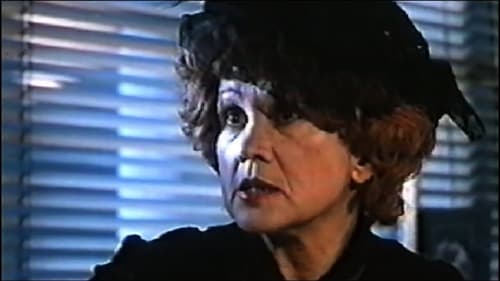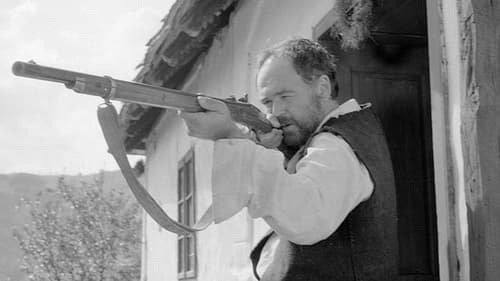
Arsa
Impure Blood (Serbian: Нечиста крв, Nečista krv) is a 1996 film adaptation of the Impure Blood novel written by Borisav Stanković. It is concerned with themes of Serbian south, in the reforming in late 19th century.

1992 Belgrade. Aleksa works the night shift at an occult magazine to avoid military police, draft and war. Old colleague, Mrs. Kosara, offers him shelter at her place. Soon, a dead friend warns him in his dream about the old lady.

Radovanov kolega s posla
A man who works in a travel agency sees his chance to quit his job and do nothing for a while after his wife found a job, but now all the kitchen work is up to him.

Gile
The election campaign in a small provincial town is in full swing. Candidates for ministry position pop up elsewhere, promising "milk and honey" to the voters. Two inseparable policemen, Boki and Pajko, are in charge of peace and order. Everything goes as usual until unexpected visitor from space shows up.

Mileta iz Miokusa
It describes the social process of stratification in the Serbian countryside during late 19th century, which occurs with the penetration of the commodity-money in the countryside. Under new conditions, peasants and farmers are unable to adapt, and rot under the burden of debts.

KGB agent I
Based upon the life and writing of literary visionary Danil Harms, a Russian avant-garde poet of the 1920s who was persecuted and ultimately silenced by the Soviet authorities.

Pjetro
This film is the true story of the creation of Labin Republic in 1921. When Italy annexed Istria, Labin area that is very rich in coal became strategically important for the new government. Domestic Croatian and Slovene population were disappointed by the method of the Kingdom of Yugoslavia of selling foreigners. Accumulated social problems and the growing terror of Italians lead to great miners' strike, led by favorite union leader Ivan Pipan. The strikers will be join young miner Ive Blazina, who as commander of the Red Guard workers struggles for the mining republic and the love of beautiful Mary Brezac. The sudden intervention of the Italian army destroys their dreams, and resigned Pipan surrenders. But not everyone agrees with his behavior.

Majstor svetla
The action takes place in 1943 and today, and a Partisan school in Srem is in the center of action. A young journalist gets appointed to shoot a film report about the participants in the Liberation War from this area. In Srem village she meets common, simple people. She discovers that a free territory and a Partisan school was there. She also finds out that everybody acted as one. Deply going through all of those events, young reporter grows mature, identifying herself with the revolution participants.

Mladen
The story of the capture of General Draza Mihailovic and his Chetniks.

After being ridiculed by his surrounding, a man who makes the wooden sculptures leaves the village with his best man to live high up in the mountain and devote to his hobby.

Zoran
Residents of a shanty town are faced with its destruction. With the help of the local trickster, Paja "the Bighead" moves with his family to an empty flat in New Belgrade blocks. Everything goes fine until the real owner knocks at the door.

Merimin muž
A young married couple live alone in the Montenegrian mountains and work hard to make ends meet. Their ordinary life is interrupted by various different characters who pass by their home, and serve as a temptation, both carnal and spiritual, which threatens to corrupt the woman's innocent soul. Each new visitor is a threat of sorts and gradually she becomes suspicious towards the world and the unknown.

Vidoje
Twelve-year-old son of a divorced parents live in a skyscraper, but the drab of urban living is somewhat improved by the proximity of hippodrome and horse farm. Boy's favorite is a former champion named Evergreen, a stud whom the administration decides to sell to the slaughterhouse. After an unsuccessful attempt to change their mind, children steal the horse and disappear. After realizing what this horse mean to them, they give it as a present to the boy's class.

Komandir
Autumn, 1941. Tito's partisans are ordered to attack a railway network system used by the Germans, their Bulgarian allies and local collaborators. A bloody battle ensues.

Kamiondžija
Šorga's, the retired boxing champion nicknamed "Tiger", wife leaves him for a wealthier guy. He meets a juvenile thief, Čok, and decides to become his father figure. In the process of changing Čok, Šorga changes himself.

Young Belgrade playboy, spoiled child of a rich family, changes for the better after spending some time in the army.

Đorđević
In 1941, a few months after German tanks forced Yugoslav Royal Army to capitulate, organized resistance is turning into massive uprising against occupying forces. Partisans, led by the Communist party, manage to chase Germans from huge territory later known as the Uzice Republic. However, forces loyal to King have some other ideas.

Vuko, a young servant of Kotor prince, makes entourage with his brother and friends in order to obtain for the daughter of Venetian Doge for the prince's son. They spend seven weeks of drinking, whoring and without thoughts of anything else. And then, one morning, running through narrow streets before the army, Vuko accidentally witnesses the fight between the knights and the guards. Vuko falls into the hands of guards, and finds himself imprisoned. Even without knowing beforehand who is Maltese, Vuko is being sworn in on the eve of execution, so that the knight would deceive his miserable destiny at least a bit.

Ceba
A young man wants to marry the beautiful daughter of a landowner who refuses to allow the marriage. To prove his worth, the young man becomes a miller in a vampire-infested local mill.

Menegasso
A poor laborer, Zilio, wants to marry Betìa, the daughter of a rich peasant woman. After number of refusals Zilio is desperate, but Nale, a young lover, combines a frontal marriage between the two, convinced they can take advantage of it. After the ceremony, however, the legitimate husband stabs Nale who seemingly dies, but actually prepares a joke for the couple.

Baron
A young barber comes to the small village to open a barbershop. He gradually gets to know with the locals and farmers, makes friends with them and even tries to organize the plans, activities and schedules of the village. He also runs a parallel, intimate life with the several village girls. When the locals realize that these plans will not come true, they blame him for the failure.

Traktorista
A priest’s daughter from a small town falls in love with cross country running over TV. She starts to train. She runs, meets a local boy and falls in love. She runs again, meets a black man and starts flirting. The local boy kills a black man out of jealousy and the police kills him.

Novi šumar
Young teacher first experience in their profession acquired in a remote mountain village, which has no school building. Life of a farmer, a clash between two warring race, then the conflict between the government and farmers for cutting the national forests needed to build new schools and the presence of a young teacher who doubt the search for truth, that will lead to major conflicts and tragedies.

Everything happens during the course of a day. A toddler looks for his lost toy, some people look for their happiness, circling around in some kind of a lost kaleidoscope; they love and hate, suffer and enjoy, being that honest or fake, joyful or saddening. In the end, the boy finds his kaleidoscope, but the question remains if grownups have found their dreams, or at least their traces.

Assistant Camera
"Andremo in città" (We'll Go to the City) is a 1966 Italian drama film directed by Nelo Risi. It is based on the novel of the same name by Edith Bruck, Risi's wife. Bruck, a Hungarian concentration camp-survivor, settled in Italy after the Second World War and wrote about her experiences in autobiographical and fictional formats.[1] The film stars Geraldine Chaplin and Nino Castelnuovo.























